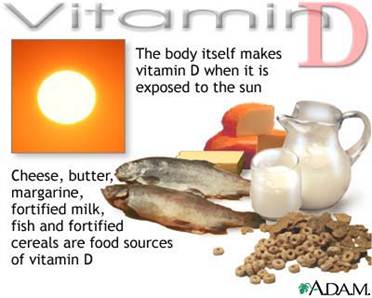 A new study shows that people with a good supply of vitamin D have a reduced risk of developing Type 2 diabetes, while individuals with lower concentrations of vitamin D in their blood have a higher risk. This effect could be attributed to, amongst other things, to the anti-inflammatory effect of vitamin D. A new study shows that people with a good supply of vitamin D have a reduced risk of developing Type 2 diabetes, while individuals with lower concentrations of vitamin D in their blood have a higher risk. This effect could be attributed to, amongst other things, to the anti-inflammatory effect of vitamin D.
 The human body can produce vitamin D itself if it has sufficient exposure to sunlight. The UVB radiation in natural daylight splits the precursor of vitamin D, 7-dehydrocholesterol, in the skin and forms provitamin D3. Further vitamin D synthesis occurs in the liver and kidneys. In addition, the supply can be improved by eating specific foods, such as oily fish, eggs and milk products, or by taking vitamin D supplements. The human body can produce vitamin D itself if it has sufficient exposure to sunlight. The UVB radiation in natural daylight splits the precursor of vitamin D, 7-dehydrocholesterol, in the skin and forms provitamin D3. Further vitamin D synthesis occurs in the liver and kidneys. In addition, the supply can be improved by eating specific foods, such as oily fish, eggs and milk products, or by taking vitamin D supplements.
 The researchers measured baseline levels of 25-OHD in 416 case subjects with incident type 2 diabetes and 1,267 non case subjects selected from a source population of 7,936 middle-aged participants in the population-based Monitoring of Trends and Determinants in Cardiovascular Disease (MONICA)/Cooperative Health Research in the Region of Augsburg (KORA) study. The researchers measured baseline levels of 25-OHD in 416 case subjects with incident type 2 diabetes and 1,267 non case subjects selected from a source population of 7,936 middle-aged participants in the population-based Monitoring of Trends and Determinants in Cardiovascular Disease (MONICA)/Cooperative Health Research in the Region of Augsburg (KORA) study.
 The results of the study conclude that that vitamin D status is inversely related to type 2 diabetes risk and the data suggest that this association may be partially mediated by subclinical inflammation. The results of the study conclude that that vitamin D status is inversely related to type 2 diabetes risk and the data suggest that this association may be partially mediated by subclinical inflammation.
|
 |

